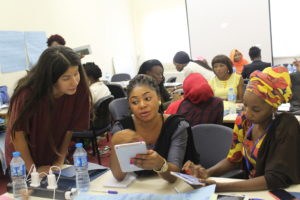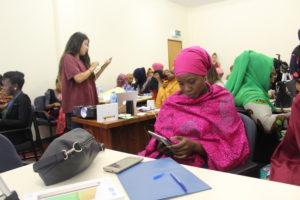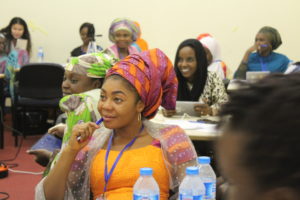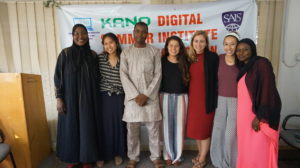During the summer of 2017 the African Studies Program at SAIS, along with the Centre for Information Technology and Development (CITAD), Women’s Rights Advancements and Protection Alternative (WRAPA), and The Everett Program at UC Santa Cruz, launched The Abuja Digital Institute for Northern Nigerian Women.
The institute’s goal was to promote the participation of northern women in Nigeria’s rapidly growing digital economy by responding to numerous barriers that exclude them from obtaining digital skills, develop the marketable skills of young northern women, and maximize the latent value of the indirect, perhaps less tangible, benefits acquired by women who participated in a collaborative digital learning experience taught by women. The institute was funded by the generous donations of the Headley Family and Amal Hassan with Outsource Nigeria (http://www.outsource.ng/).
The institute recruited dozens of young women possessing the basic ICT skills required for absorbing more intensive training in order to acquire competence in the practical tools of digital communication and product development. Many of these women came to the institute with an entrepreneurial endeavor in mind, or else an existing business they sought to further develop using the digital skills taught by the institute.
Students and staff from each program volunteered their time and knowledge to act as instructors or coordinators. The volunteers from the Everett Program developed much of the curricula for the skills courses to be taught, and students from SAIS and the Everett Program directly facilitated these classes. Courses included social media promotion, blogging, graphic design, video editing, and photography, among others. In a meaningful reversal of the typical gender roles, every course was taught by a woman from one of the sponsoring programs, with the men working as supportive administrative staff.
Emily Weiss, an active SAIS African Studies student, worked for the institute in several capacities. She coordinated the training sessions in Abuja and Kano and collected participant evaluations of the curriculum, in addition to teaching some of the skills sessions, such as public speaking. Emily also spent a majority of the summer working in Kano with Adam Smith International on a project called MAFITA, which aimed to train marginalized youth on vocational skills to provide them with a better future and a way out of poverty.
Being from Northern Nigeria himself, SAIS African Studies student Jonathan Eigege was involved in the participant recruiting process. He stressed that the participant group should reflect Northern Nigeria’s diversity. Along with student Nasir Ingawa, about 30 women from different backgrounds were recruited for the program.




